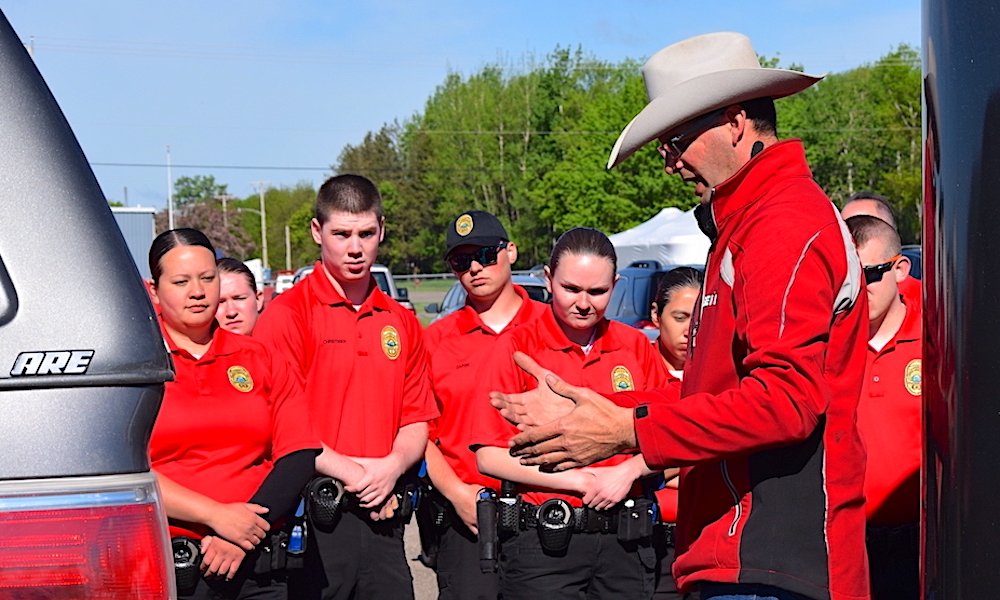Natural Resource Law Enforcement A.A.S. Degree
Career Description
Students in the Natural Resources Law Enforcement Program learn skills that lead to becoming a conservation officer. Conservation officers work with fish and wildlife agencies, state parks, trails, forests, waters and wetlands, as well as work in educational activities within and throughout Minnesota. Conservation officers often work from 4×4 patrol vehicles, snowmobiles, ATV, and various watercrafts. The selection process for being a conservation officer in Minnesota includes a written exam, division interview, background investigation, functional capacity exam, psychological assessment and a medical evaluation. In addition, conservation officers must be a United States Citizen, possess a valid Minnesota driver’s license, have no felony convictions, have the ability to swim and possess a license or be eligible for licensing as a Minnesota peace officer at the time of hire.
Program Information
Get a hands-on learning experience outside of the classroom walls with weekly fieldwork in the woods. This two-year program has produced many successful conservation officers who work throughout the Midwest and inside the federal government. A fleet of new state-of-the-art squad cars gives students a driver’s seat view into law enforcement. Because of a close partnership between area law enforcement and the college, students have a wide selection of choices for internships. With this Natural Resource Law Enforcement A.A.S Degree, you can be a conservation officer or hold nearly any other law enforcement position.
Program Outcomes
Graduates will be able to:
- Demonstrate field identification of regionally important mammals, birds and fish and their communities;
- Use a broad range of technological tools to research, document, map, measure, record and analyze data relevant to natural resources;
- Navigate and safely function in an outdoor workplace;
- Demonstrate knowledge of structure, process and relationships between law enforcement, the courts and correctional systems;
- Apply tactical skills, weapon safety, defense and arrest tactics, vehicle operation, crisis management and force options;
- Process crime scenes from preliminary stage through disposition;
- Function in a multicultural society as a mature, adaptable citizen, while meeting the needs and challenges of clients and communities;
- Interpret and apply theory, law, policy and practice as it relates to juvenile delinquency and deviant behavior;
- Demonstrate an understanding of the roles of the legislative, judicial and executive branches and how they relate to criminal law;
- Apply knowledge of criminal law, constitutional law and Minnesota traffic code;
- Demonstrate strong and effective written and oral communication skills; and
- Understand the importance of ethics and ethical behavior in law enforcement.
Special Program Requirements
In addition to the program requirements, students must meet the following conditions in order to graduate
- College Cumulative GPA Requirement: cumulative grade point average (GPA) of credits attempted and completed at CLC must be at least 2.0;
- College Technical Core GPA Requirement: cumulative GPA of credits attempted and completed towards the technical core of the diploma or degree must be at least 2.0;
- Residency Requirement: students must complete 25% of their credits at Central Lakes College;
- Courses required for Minnesota P.O.S.T. licensing must be completed within three (3) years of starting the certificate;
- Students must have a valid Emergency Medical Responder certification (or higher) at the time of the Post Board Exam.
Admissions
- Students must complete and pass a background check prior to being officially admitted into the program. This background check must be completed prior to the first day of classes.
- Students must also complete the Minnesota Multiphasic Personality Inventory (MMPI) with a psychologist approved by the Program Coordinator prior to admission into the program.
- Students must have completed, or be concurrently enrolled in, an Associate in Arts, Bachelors, or Criminal Justice AAS Degree from an accredited institution for admission into this program.
- Student must be able to complete the skills portion of the program to become licensed. This involves several real-life crime scene situations, firearms and physical proficiency, and law enforcement procedural practices.
Please see the Criminal Justice Coordinator for further information.
Transfer Opportunities
Central Lakes College has an Articulation Agreement with Bemidji State University for transfer of Criminal Justice courses. Other colleges and universities conduct a student-by-student evaluation regarding transfer of courses and degree. Please see an advisor for further information.
Employment Statistics
For more information regarding employment statistics, career salary information and estimated job growth, follow the resource links below
https//apps.deed.state.mn.us/lmi/ces/
http//www.bls.gov/ooh/home.htm
Salary information from indeed.com

Program Course Requirements
REQUIRED CORE COURSES (35 credits)
CRJU 1101 Criminal Justice, 3 cr
CRJU 1104 Juvenile Justice, 3 cr
CRJU 2101** Criminal Law, 3 cr
CRJU 2102 Criminal Procedures, 4 cr
CRJU 2108 Criminal Investigations, 3 cr
CRJU 2140 Law Enforcement and Behavioral Science, 3 cr
NATR 1106 Intro to Natural Resources Law Enforcement, 2 cr
NATR 1125 Ichthyology, 3 cr
NATR 1130 Mammalogy, 3 cr
NATR 1135 Ornithology, 3 cr
NATR 1360 Animal Behavior, 3 cr
NATR 2110 Herpetology, 2 cr
ADDITIONAL REQUIRED CORE COURSES
Choose one of the following tracks:
Professional Peace Officer’s License track (24 credits)
CRJU 1112 Police and the Community, 3 cr
CRJU 2106** Fitness for Law Enforcement, 2 cr
CRJU 2114** Traffic Law, 3 cr
CRJU 2124 General Evidence and Identification Preparation, 4 cr
CRJU 2160* Use of Force, 2 cr
CRJU 2162* Firearms, 3 cr
CRJU 2164* Patrol Practicals, 5 cr
CRJU 2166* Tactical Communications/Relations, 2 cr
Non-Licensure Track (20 credits)
NATR 1112 Land Measurement, 3 cr
NATR 1120 Dendrology, 3 cr
NATR 1140 Limnology, 3 cr
NATR 1200 Introduction to Natural Resources, 3 cr
NATR 1280 Introduction to GPS & GIS, Arc View), 2 cr
NATR 2130* Wildlife Management, 3 cr
NATR 2140* Fisheries Management, 3 cr
REQUIRED GENERAL EDUCATION (17 credits)
Students must complete the requirements listed in the AAS Degree/General Education Transfer Curriculum document.
BIOL 2415 General Ecology, (Goals 3, 10), 4 cr
COMM 2420 Intercultural Communication (Goals 1,7), 3 cr
ENGL 1410 Composition I, (Goal 1), 4 cr
SOCL 2405 Criminology, (Goal 5), 3 cr
SOCL 2481 Race, Ethnicity and Oppression, (Goals 5, 7), 3 cr
GRADUATION REQUIREMENT – 72 CREDITS
*Denotes Prerequisites
**These courses must be completed prior to SKILLS.
NOTE: Students must have the Emergency Medical Responder certification, or higher) and the card must be valid at the time of the Post Board Exam.
Individual semester plans are determined between instructor and student to best meet the student’s needs.
Program Instructors
| Photo | First Name | Last Name | Position | Department | Phone | Alt. Phone: | URL | wdt_ID | Details | |
|---|---|---|---|---|---|---|---|---|---|---|
 |
Aubrey | Beadell | Advisor | TRIOStudentSupportServices | (218) 855-8014 | aubrey.beadell@clcmn.edu | 1 | More details | ||
 |
Nick | O'Reilly | Occupational Skills Program College Lab Assistant | OccupationalSkills | 218-855-8077 | Nicholas.oreilly@clcmn.edu | 2 | More details | ||
 |
Kevin | Lomax | College Lab Assistant | Automotive Faculty | 218-855-8000 | KLomax@clcmn.edu | 3 | More details | ||
 |
Jody | Flynn | Accessibility Services Assistant | Accessibility | 218-855-8056 | jody.flynn@clcmn.edu | 5 | More details | ||
 |
Deana | Bobzien | Instructor | CollegeCareerStudies - Mathematics - Supportive Services | 218-855-8339 | deana.bobzien@clcmn.edu | 7 | More details | ||
 |
Brianna | Rajkowski | Advisor | TRIOStudentSupportServices | 218-855-8228 | brianna.rajkowski@clcmn.edu | 8 | More details | ||
 |
Cynthia | Dionysius | AD Nursing Faculty | NursingASDegree | 218-855-8133 | cindy.dionysius@clcmn.edu | 9 | More details | ||
 |
Tajia | Anderson | PSEO Specialist | Admissions - CollegeCreditInHighSchool- PSEO | (218) 855-8079 | tajia.anderson@clcmn.edu | 10 | More details | ||
 |
Brent | Balmer | Audio Visual Education Specialist | Videography | (218) 855-8230 | brent.balmer@clcmn.edu | 13 | More details | ||
 |
David | Gray | Instructor | History | 218-855-8276 | david.gray@clcmn.edu | 14 | More details | ||
 |
Jim | Nagy | Adjunct Instructor | GraphicDesign | 218-855-8157 | james.nagy@clcmn.edu | 15 | More details | ||
 |
Brandon | Schneider | Instructor | HeavyEquipment | 218-894-5179 | brandon.schneider@clcmn.edu | 16 | More details | ||
 |
Natalia | DePauw | Director of Dual Enrollment | Advising - PSEO - CollegeCreditInHighSchool | 218-855-8263 | natalia.depauw@clcmn.edu | 18 | More details | ||
| Amy | Disterhaupt | Admissions Specialist | Admissions | 218-855-8250 | amy.disterhaupt@clcmn.edu | 20 | More details | |||
 |
Nick | Heisserer | Dean of Brainerd Career & Technical Programs | Administration | 218-855-8067 | nick.heisserer@clcmn.edu | 21 | More details | ||
 |
Matthew | Krueger | Environmental Health and Safety Officer | Maintenance - Security - Safety | 218-855-8115 | matthew.krueger@clcmn.edu | 22 | More details | ||
 |
Mark | Lindquist | Instructor | Music | 218-855-8203 | mark.lindquist@clcmn.edu | 23 | More details | ||
 |
Jeremy | Goddard | Bookstore/Print Shop | Bookstore Supportive Services | 218-855-8146 | Jeremy.Goddard@clcmn.edu | 25 | More details | ||
 |
Sarah | Jennissen | Instsructor | NursingAssistant - PracticalNursing - TrainedMedicationAid | 218-894-5308 | sarah.jennissen@clcmn.edu | 26 | More details | ||
 |
Cash | Robinson | Academic Advisor | TRIOUpwardBound - Advising | 218-855-8035 | cash.robinson@clcmn.edu | 28 | More details | ||
| Anne | Radspinner | Instructor | WomensStudiesCertificate | aradspinner@clcmn.edu | 29 | More details | ||||
| Jean | Mershon | Instructor | HealthDepartment | jean.mershon@clcmn.edu | 30 | More details | ||||
 |
Ryan | Wright | Enrollment Representative | Admissions - CampusTours | 218-855-8013 | ryan.wright@clcmn.edu | 31 | More details | ||
 |
Steve | Wenzel | Instructor | PoliticalScience | 218-855-8073 | stephen.wenzel@clcmn.edu | 32 | More details | ||
 |
Julie | Woitalla | Instructor | NursingASDegree - PracticalNursing | 218-855-8168 | julie.woitalla@clcmn.edu | 33 | More details |
Photo:
First Name:
Last Name:
Position:
Phone:
Email:
